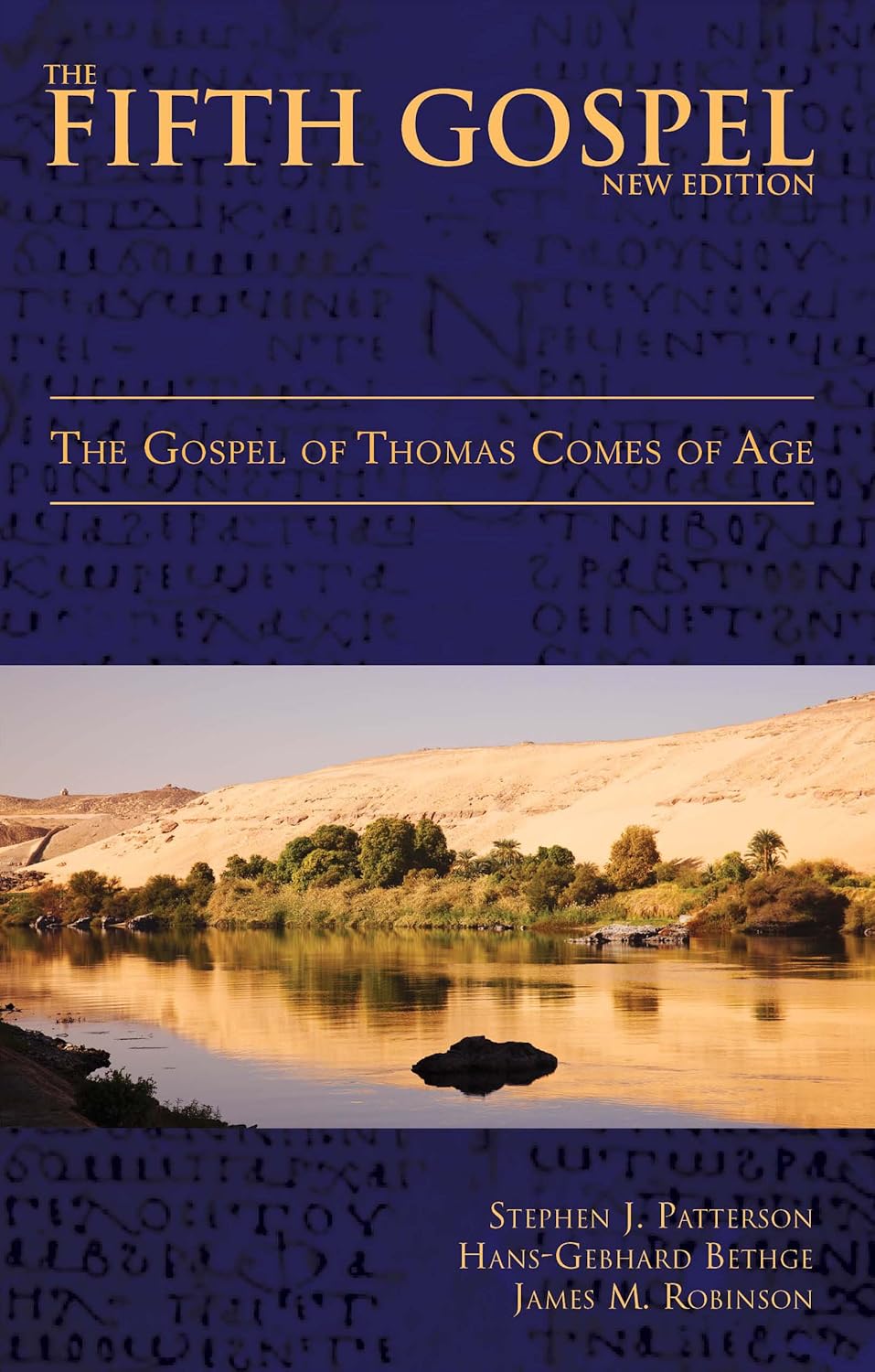Book review: The Fifth Gospel
by Stephen J. Patterson, Hans-Gebhard Bethge, and James M. Robinson
★★★★★
This is an excellent commentary on the Gospel of Thomas. It’s concise and in places speculative, but immensely informative, representing the latest scholarship on this fascinating find.
Part 1 presents a translation of the gospel; Part 2 provides commentary; Part 3 tells of its discovery at Nag Hammadi. It’s a skinny little book, but very full.
The most controversial question about this gospel seems to be its dating. Is it a collection of late second- or even third-century Gnostic sayings, or does it date back to the first century and contain the words of Jesus? The answer seems to be both. As a saying gospel, it’s much more malleable than a storyline gospel, and probably the collection grew over time. Some of the sayings seem very early; others seem quite late, surely not added until the Coptic version in Egypt began to form. (The most complete version we have is in Coptic, discovered in upper Egypt, and dating back to the fourth century.)
There are several reasons for dating parts of Thomas back to the first century. First, many sayings are quite similar to other first-century documents. Second, the rivalry it displays tends to suggest a time in early Christianity when local communities claimed loyalty to a particular well-known figurehead. Finally, its Christology is quite low. Jesus is not the Son of God or even the Son of Man. He’s just Jesus.
The association with “Thomas” should not be confused with the “doubting Thomas” of John chapter 20. Rather, it is more likely the “Judas Thomas” of John 14, Luke 6, and Acts 1. The same Judas Thomas of the Acts of Thomas, and the person to whom the epistle of Jude is attributed. If the Acts of Thomas carries any historic authenticity, then this is possibly the brother of Jesus; the Jude of Mark 6:3. Thus, we have uncovered a gospel possibly attributed not merely to one of the Twelve, but to a blood brother of Jesus.
Another confusion about this gospel is its so-called “Gnostic” bent. There just seems to no longer be a simple description of what “Gnostic” means; you won’t find any hints in Thomas of the evil creator who surfaces in other Gnostic writings. Instead, Thomas reads very much like John’s Gospel and Paul’s epistles, both in theme and theology. If Thomas is Gnostic, it’s not much more so than canonical New Testament writings, which can be just as exotic.
Yet it also appears that the Gospel of Thomas provides an independent source. Might Thomas have something to teach us about the original Jesus movement? As the book’s introduction claims, it “has reshaped the discussion of Christian origins by introducing students of early Christianity to a new set of ideas and practices that, a generation ago, one could hardly imagine as deriving from the words of Jesus.”

Matthew 16:16-17 How Divine Revelation Works
Simon Peter answered, “You are the Christ, the Son of the living God.” Jesus replied, “Blessed are you, Simon son of Jonah, for this was not revealed to you by man, but by my Father in heaven.
//Today’s verse comes from Matthew. But one of the more interesting tendencies I noted as I researched for my book about John’s Gospel is just how often John purposefully contradicts the other Gospels. Many of the contradictions, in fact, tend to downplay something miraculous, such as this divine revelation to Simon Peter. There seems to be an undercurrent of rivalry going on with Peter in the Fourth Gospel. Here, John pooh-pooh’s Matthew’s explanation and sets the record straight about how Simon Peter learned who Jesus was:
The first thing Andrew did was to find his brother Simon and tell him, “We have found the Messiah” (that is, the Christ). –John 1:41
But this begs the question. Could it have been explained to Peter and also come as a revelation to him? In other words, does “revelation” mean something more along the lines of proving the truth about Jesus for yourself? “Revelation,” then, is not some means of divine discloser of a secret but rather making a known truth your own. Does this resonate with anyone else?
Numbers 15:35, Fifteen Crimes Requiring the Death Penalty
And the LORD said unto Moses, The man shall be surely put to death: all the congregation shall stone him with stones without the camp.
//Today’s verse refers to a man who was discovered picking up sticks on the Sabbath day. There are actually fifteen crimes worthy of death, according to the Old Testament law:
- Premeditated murder
- Kidnapping
- Rape of woman already betrothed.
- Adultery
- Homosexuality
- Incest
- Bestiality
- Offering human sacrifices
- False prophecy
- Blasphemy
- Ignoring the Sabbath
- Sacrificing to false gods
- Disobedience to parents/authority
- Striking or cursing parents
- Magic and divination
Contrast these to the words of Jesus: “”Let him who is without sin among you be the first to throw a stone…”
Book review: Love Times Three
by Joe, Alina, Vicki, and Valerie Darger
★★★★★
In the celestial glory there are three heavens or degrees; and in order to obtain the highest, a man must enter into this order of the priesthood [meaning, the new and everlasting covenant of marriage]; and if he does not, he cannot obtain it. –Doctrine and Covenants 131:1-3
Joe, Alina, Vicki, and Val are the parents of 21 children, sharing a 5,500 square-foot home in Utah. Yes, the authors are married … to each other, living the Principle, celestial marriage, the only way to obtain heaven’s highest reward. This is a real-life inside peek at Mormon polygamy, without the sensationalism. If the only thing you know about Mormon Fundamentalists is what you’ve seen on TV about Warren Jeffs (whose coerced marriages to underage girls and sexual abuses landed him on the FBI’s Most Wanted List in 2006), then you’re the target audience of JAV&V.
Between the 25 of them, they share ten family cars. They do ten loads of laundry a day, run through 36 rolls of toilet paper a week, and consume 3-5 loaves of daily bread. (I imagine that Matthew 6:7 is a verse often quoted.) Life is complex, busy, fulfilling, and … generally quite happy, especially for the children. The most trying obstacle to their lifestyle may be the required secrecy, for polygamy remains against the law in Utah, punishable by up to five years in prison.
But this married quartet have had enough of living a white lie. Says Joe, “It’s time to end our silence, and time for us to share with the world what living in a polygamous family is really like.” So, the four of them take turns in this daring book talking about the trials and rewards of their chosen way of life.
Jealousy is one of the more serious trials, of course. Joe must carefully balance his devotion between his three wives. A carefully-planned schedule determines where he sleeps each night, who gets the next date, and who sits in the front seat beside him as as he drives. Money management is inevitably another problem in celestial marriages, when you’re trying to feed and clothe a couple dozen people. Persecution by bigoted acquaintances, often in the workplace, is a third. But life isn’t meant to be easy.
All in all, this lifestyle surely isn’t for me, but I fail to see why polygamist practices as wholesome as that described in Love Times Three don’t deserve the same respect we seem to be finally awarding to other alternative marriage arrangements.

Revelation 17:3, The Woman Riding the Scarlet Beast
Then the angel carried me away in the Spirit into a desert. There I saw a woman sitting on a scarlet beast that was covered with blasphemous names and had seven heads and ten horns.
//Here is an image that captivates! John of Patmos sees a vision of a woman riding a scarlet beast. Most Revelation interpreters recognize the beast to be the City of Rome, and I agree. Not today’s Rome, of course, but the Rome of the first century. Yet who is the woman?
Revelation calls this mysterious woman “the great prostitute,” and I think it’s safe to conclude she’s also the “whore of Babylon,” another Revelation theme. The majority of scholars here identify the woman again with Rome, equating Babylon with Rome.
But this woman isn’t the beast. She rides the beast. The question becomes, who rides atop Rome?
The answer, I’m convinced, is Jerusalem. But the reason can’t be satisfactorily explained in a few words, providing me with a great opportunity to shamelessly plug my book about Revelation.
Pick up Revelation: The Way it Happened if you want an in depth peek into first-century Christian thinking, and why God turned His back on Jerusalem.
Judges 9:8-13, Obama or Romney?
How are we to choose a leader over us? What is a good leader’s primary responsibility? Does the Bible provide any input?
No, I’m not going to turn this blog into a political forum, but this parable by Jotham in the book of Judges might be illuminating:
“One day the trees went out to anoint a king for themselves. They said to the olive tree, ‘Be our king.’
“But the olive tree answered, ‘Should I give up my oil, by which both gods and men are honored, to hold sway over the trees?’
“Next, the trees said to the fig tree, ‘Come and be our king.’
“But the fig tree replied, ‘Should I give up my fruit, so good and sweet, to hold sway over the trees?’
“Then the trees said to the vine, ‘Come and be our king.’
“But the vine answered, ‘Should I give up my wine, which cheers both gods and men, to hold sway over the trees?’
“Finally all the trees said to the thornbush, ‘Come and be our king.’
The “thornbush” in Jotham’s little parable is his brother Abimelech. Jotham climbed up a hill, shouted these words, and then fled for his life. But is there a lesson in his parable? Is it possible to find a leader who is more interested in serving than gaining power?
Book review: Why Jesus?
by William H. Willimon
★★★★
My previous review was a book with the same title: “Why Jesus.” That one was Ravi Zacharias; this is by William H. Willimon. I thought I would compare the two, but as it turns out, the two books are so different it’s a pointless exercise. I’ll give four stars to Willimon, simply for doing what he says he’ll do.
I confess, it took me a while to get into this one. The style doesn’t fit me; too hip, too informal. Too cute. An example will give you a feel for the book’s flavor: Jesus attends a “soiree” and a “woman of the city” shows up and makes a scene, caressing his feet, letting down her hair, and in general putting the party into an uproar. A Pharisee sneers that if Jesus were a real prophet, he would know what sort of woman she is. As Willimon tells the story,
Jesus replies to the Pharisee, “Simon, do you see this woman? I show up here expecting a good time, and you didn’t kiss me or give me a foot massage. She knows how to get down and party.”
Jesus then puts it in a parable: “A man was owed ten dollars by one debtor, ten thousand dollars by another. He forgave both debtors. Now, think hard, Mr. Religious Expert—which man was the most grateful?”
“Er, uh, I guess the one who was forgiven more,” answers the Pharisee.
Yeah, it took some getting used to, even though Willimon stayed true to his promise to present Jesus “as the gospels do”: a “wild, weird, and improbable character.” In time, however, I began to appreciate Willimon for his devotion to Jesus. I began to see why Jesus means so much to him. I began to see how many Christians, very different than me, can be inspired by this same Jesus—who seems to meet the needs of just about everyone one way or another. Jesus wears a dozen hats the way Willimon tells it. You’ve met Jesus the Party Person already, so I’ll just list the rest:
Whatever you’re looking for in a Savior, it’ll be in there somewhere!

Mark 1:1, The Son of God!
The beginning of the gospel about Jesus Christ, the Son of God.
//Much is made by scholars about the fact that Jesus called himself the Son of Man, and rarely, if ever, called himself the Son of God. Using the first Gospel written as a basis, we find the phrase Son of Man thirteen times … all of them from the lips of Jesus himself.
A hidden Markan theme, however, is that Jesus is more than he claims to be! Mark begins his Gospel with the claim that Jesus truly is the Son of God. A short bit into the story, we’re reminded again:
Whenever the evil spirits saw him, they fell down before him and cried out, “You are the Son of God.” –Mark 3:11
Then we’ll hear no more about this title until the end of the story. In Mark’s Gospel, the disciples never do catch on. Jesus dies with his true identity still a secret, recognized by only one unlikely man:
And when the centurion, who stood there in front of Jesus, heard his cry and saw how he died, he said, “Surely this man was the Son of God!” –Mark 15:39
Mark’s Gospel originally ended with verse 16:8. Three women discover the tomb empty, and run away afraid, telling no one what they saw. Jesus’ secret remains intact.
John 4:28-29, The First Evangelist
Then, leaving her water jar, the woman went back to the town and said to the people, “Come, see a man who told me everything I ever did. Could this be the Christ?”
//This woman is sometimes called the “first evangelist” in the New Testament. Do you recognize who she is?
The story comes from John’s Gospel. She is, of course, a woman … hardly what you would expect of a respected news-bringer. A woman’s word in the first century counted for little; they were not even allowed to offer testimony in a court of law.
She is also a Samaritan, a people hated by the Jews of Jesus’ time. The Samaritans were once Israelites, but they became polluted by intermarriage with other nations (primarily the conquering Assyrians) and thus were considered half-breeds.
She is slow to understand. It seems impossible for her to grasp the idea of living water.
And she is disreputable, having had five husbands, and now living with a man who was not her husband.
Yes, the person selected by Jesus to first carry his message is the anonymous “woman at the well.” Who’d a thunk?
Isaiah 14:3-5, The Origin of Lucifer, part III of III
It shall come to pass in the day the LORD gives you rest from your sorrow, and from your fear and the hard bondage in which you were made to serve, that you will take up this proverb against the king of Babylon, and say: “How the oppressor has ceased, The golden city ceased! The LORD has broken the staff of the wicked, The scepter of the rulers;
//In part I of this discussion, I pointed out the origin of the name Lucifer, and how its meaning evolved through various translations.
In part II, I pointed out how we have combined the scriptural writings of authors living hundreds of years apart to apparently solve a puzzle, building the story of Lucifer as another name for Satan, who was cast out of heaven. This understanding prevailed throughout much of the church history, up to the time of the Reformation when we began to examine scripture more critically.














 354 Circles
354 Circles
 603 Goodreads Friends & Fans
603 Goodreads Friends & Fans

 Hello! I'm an author, historical Jesus scholar, book reviewer, and liberal Christian, which means I appreciate and attempt to exercise the humanitarian teachings of Jesus without getting hung up on any particular supernatural or religious beliefs.
The Bible is a magnificent book that has inspired and spiritually fed generations for thousands of years, and each new century seems to bring a deeper understanding of life’s purpose. This is true of not only Christianity; through the years, our age-old religions are slowly transforming from superstitious rituals into humanitarian philosophies. In short, we are growing up, and I am thrilled to be riding the wave.
I avidly read all thought-provoking religion titles. New authors: I'd love to read and review your book!
Hello! I'm an author, historical Jesus scholar, book reviewer, and liberal Christian, which means I appreciate and attempt to exercise the humanitarian teachings of Jesus without getting hung up on any particular supernatural or religious beliefs.
The Bible is a magnificent book that has inspired and spiritually fed generations for thousands of years, and each new century seems to bring a deeper understanding of life’s purpose. This is true of not only Christianity; through the years, our age-old religions are slowly transforming from superstitious rituals into humanitarian philosophies. In short, we are growing up, and I am thrilled to be riding the wave.
I avidly read all thought-provoking religion titles. New authors: I'd love to read and review your book!
 Hi! While Lee writes the articles and reviews the books, I edit, organize, and maintain the blog. The views expressed here are Lee's but I'm his biggest supporter! :-)
Hi! While Lee writes the articles and reviews the books, I edit, organize, and maintain the blog. The views expressed here are Lee's but I'm his biggest supporter! :-)
Connect With Me!